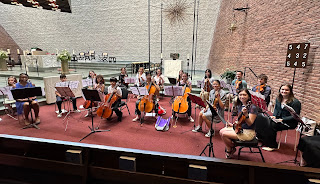Surprise Current and Alumni Musicians Ensemble 2024
Music education for children is not just about learning notes and rhythms; it's about fostering a deep appreciation for the art form and developing skills that go beyond mere technical proficiency. One vital aspect often overlooked is performance. Whether it's a solo recital, a school concert, or a community event, stepping onto the stage is a crucial component of a child's musical journey. In this blog post, we delve into why performing is an indispensable part of music study for children.
Performing in front of an audience can be daunting, even for seasoned musicians, let alone children who are just starting their musical journey. However, it's precisely this challenge that helps build confidence. When a child prepares for a performance, they learn to manage their nerves, practice diligently, and present themselves with poise and assurance. These skills extend far beyond the stage, benefiting them in various aspects of life, from public speaking to social interactions.
Mastering a musical instrument requires discipline and perseverance. Regular practice, adherence to a schedule, and attention to detail are essential for progress. Performing adds another layer to this discipline. It instills a sense of responsibility in children as they commit to rehearsals, polish their pieces, and strive for excellence. The discipline cultivated through performing spills over into other areas of their academic and personal lives, promoting a strong work ethic and self-motivation.
Music is not merely about playing the right notes; it's about conveying emotions, telling stories, and connecting with the audience on a deeper level. Performing offers children the opportunity to explore the expressive aspects of music. Through interpretation and stage presence, they learn to infuse their performances with passion, sensitivity, and personal flair. This journey of musical expression fosters creativity and encourages children to develop their unique artistic voice.
While practicing an instrument often involves solitary work, performing is inherently collaborative. Whether playing in an ensemble, accompanying a vocalist, or participating in a group recital, children learn the importance of teamwork and cooperation. They must listen to others, adjust their tempo and dynamics, and synchronize their efforts to create a harmonious performance. These collaborative experiences not only deepen their musical understanding but also nurture essential social skills such as communication, empathy, and respect for others.
Performing provides a tangible milestone for children to showcase their progress and celebrate their achievements. It's a moment of pride and validation, both for the performers and their teachers and parents. The applause, smiles, and sense of accomplishment that accompany a successful performance reinforce the value of hard work and dedication. Moreover, overcoming performance challenges instills resilience and teaches children to embrace setbacks as opportunities for growth.
In the journey of music education, performing is not an addendum; it's an integral part of the curriculum. Beyond honing technical skills, performing cultivates confidence, discipline, musical expression, collaboration, and a sense of achievement in children. As educators, parents, and mentors, we must recognize the transformative power of the stage and provide ample opportunities for children to share their musical talents with the world. After all, it's not just about playing the notes—it's about sharing the joy of music and making memories that last a lifetime. With all of this said, I will never force a child to perform. I will expose them to performances, encourage them to enjoy the clapping and pagentry. I tell all students who don't want to perform in recital that they can decide to be a 'special guest performer'. They just to have to get my attention.












Comments
Post a Comment